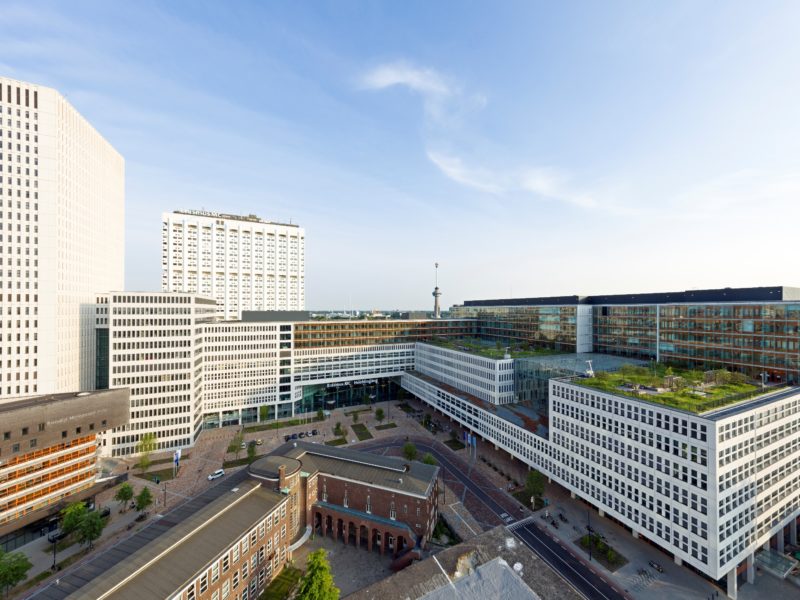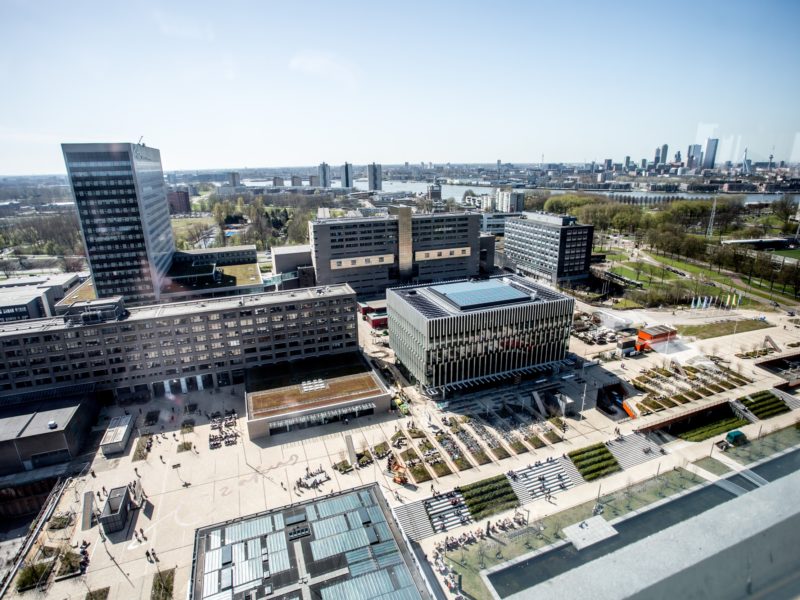
Better prepared for calamities with the Pandemic & Disaster Preparedness Center
Showcase
Erasmus MC, Delft University of Technology and Erasmus University Rotterdam are creating a Pandemic & Disaster Preparedness Center (PDPC). This innovation and knowledge center will bring together renowned scientists with expertise on pandemic threats and climate-related calamities to establish an ambitious agenda for the future.
The plans for a Pandemic & Disaster Preparedness Center are based on the wishes of Prof. Marion Koopmans, who hopes that the current level of vigilance does not weaken once the pandemic is under control.
“Everyone is now aware of the huge impact a global pandemic can have on all aspects of society. That’s why now is the time to persevere and press ahead. During a consultation with fellow scientists at Delft University of Technology, it emerged that there are significant parallels with research on disasters, a field in which Delft University of Technology (TU Delft) is specialized”, according to Koopmans.
The idea is being developed by a group of enthusiastic experts. TU Delft and Erasmus MC, together with Erasmus University Rotterdam, are affiliated in a fusion of expertise: the Convergence. For more than a year now, this partnership has fused the medical expertise of Erasmus MC with the technological expertise of TU Delft and the sociological knowledge of Erasmus University Rotterdam.
The Pandemic & Disaster Preparedness Center falls under the umbrella of the Convergence. Fifty engineers, physicians, and scientists from the participating institutions are already affiliated with the PDPC. The municipality of Rotterdam supports the initiative wholeheartedly.

Lessons for the future
The current pandemic is providing a wealth of information and lessons for the future. The Pandemic & Disaster Preparedness Center is of the opinion that we must and can be better prepared. “The lightning speed with which the new vaccine types were developed was possible thanks to years of investments in fundamental knowledge”, says Koopmans. “Those kinds of investments are also necessary as we look to the future: what other virus threats are out there? How can they be recognized? What makes viruses transmissible? Can we predict outbreaks and pandemics? Can we develop vaccines for whole groups of viruses?”
Scientists have also learned from previous types of disasters, such as flooding, heat waves, and periods of extreme drought. Society has already benefited from many of these lessons, including through the construction of the Delta Works following the North Sea Flood of 1953.
By bringing together all the expertise and information in a kind of reservoir of data, the Pandemic & Disaster Preparedness Center can start to simulate disaster scenarios, revealing weak areas in the system. You can then work with urban planners, architects, landscape developers, behavioral scientists, and citizens to come up with solutions to these weaknesses.
Incidents such as flooding or pandemics always set off a cascade of consequences. By gathering and correlating scientific data, you can identify certain adverse effects, the pressure points. The data makes it clear that the COVID pandemic not only makes people ill, but is also causing the entire healthcare system to grind to a halt. This has led to various collaborative initiatives being started during the pandemic between researchers of TU Delft and Erasmus MC. Researchers must use these times of hardship to amass knowledge that can be used for improving preparation, or in medical terms: to predict and prevent.
Test project
The Pandemic & Disaster Preparedness Center (PDPC) is working on interesting test projects. An example is the project by Bas Jonkman (TU Delft), an expert in flooding and the effects of flooding. “We are simulating storms and other disasters in this test project to reveal bottlenecks such as stagnant water, which is a source of infectious diseases”, illustrates Jonkman.
“But we are also identifying blockages of bridges and tunnels, and we are looking at the effects of traffic flows and effects on people’s behavior. By sharing expertise, we can also highlight the effects on healthcare.
Scientists are also using these insights into logistics in experiments to reopen social traffic safely during this pandemic. All the data can then also be used to develop training sessions. The data can also be shared with policymakers to answer the question: what are we going to do to prepare ourselves?
“The current pandemic has had an unprecedented effect on society. This crisis has taught us that social inequality increases as the result of a pandemic and that human behavior is an undisputed factor for crisis management”, says behavioral scientist Prof. Semiha Denktas, affiliated with Erasmus School of Social and Behavioural Sciences.

Not covered
Early in December, Marion Koopmans and her colleagues realized that science-based preparedness in the area of outbreaks and climate disasters has not been previously covered. And: it would be a real shame if the current lessons learned and vigilance shown were to fade away again after the pandemic.
At the end of World War II, Winston Churchill said: Never waste a good crisis. Marion Koopmans has now added: ‘’Sustain technology and boost creativity, invest in your future breakthroughs, and do it together.”
In other words: turn the ‘never again’ sentiment into actions and remain actively engaged in preparing for new disasters, for one thing is sure, warn scientists: With the major changes taking place all over the world, including climate change, at the back of our minds, the question is not whether we will be confronted with new disasters, but when.
Delta
The city of Rotterdam will serve as a living field lab for the PDPC. Rotterdam is located in a river delta. It has a huge port with lots of traffic, and a very diverse population. Moreover, it has many high rise buildings and a high concentration of concrete. This means there is a high risk of damaging heat waves, excessive rainfall, as well as hotspots for infectious diseases. This is why the municipality of Rotterdam is so positive about the PDPC.
Experts now know that abundant water and water storage, for example, is a potential risk factor for the outbreak of infectious diseases. Stagnant water contains harmful microorganisms and is a breeding place for mosquitoes, which are becoming more harmful as a result of global warming. Tiger mosquitoes, for example, are being spotted in the Netherlands with greater frequency.
All of these factors make Rotterdam an excellent place to serve as a living laboratory. “Researchers from Erasmus MC and TU Delft, along with physicians from the Rotterdam-Rijnmond Municipal Health Service (GGD) are already working closely together to gain a better understanding of the spread and control of COVID-19 in the region, using innovative techniques such as risk-based testing, sewage testing, and behavioral science research”, illustrates Koopmans.
Mobility labs
Furthermore, all researchers will soon be able to make use of the facilities of the Convergence institutes. Erasmus MC has the Skillslab and the Core Facilities, TU Delft has a whole range of labs focusing on artificial intelligence, water, mobility and more.
In time, researchers from other institutions will also be able to join with related research proposals. The Pandemic & Disaster Preparedness Center will be based at Delft University of Technology and Erasmus MC. Eventually, a joint location will be sought for the Convergence, where the PDPC can also perform its work. The PDPC will of course also work closely with the Netherlands Centre for One Health, where a multitude of institutes already conduct multidisciplinary research on outbreaks of infectious diseases, and where Marion Koopmans plays an important role.
https://www.erasmusmc.nl/nl-nl/patientenzorg/artikelen/convergentie

Erasmus MC




